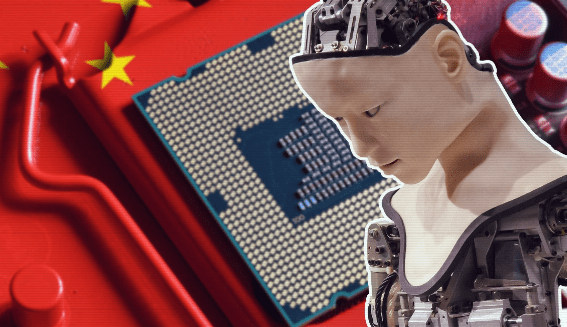China’s participation in the AI Summit in London: Not Free of Controversy or Contradiction
The intersection of technology, politics, and international relations often sparks intense debates and controversies, and one such topic of discussion in recent times is the involvement of China in global AI governance. The ongoing technological decoupling between China and the West has not prevented both sides from converging to discuss the potential threats and challenges posed by runaway artificial intelligence. This convergence was evident at the landmark AI safety summit organized by the U.K. government, which brought together prominent figures from around the world to address the existential risks associated with AI. Among the attendees was Wu Zhaohui, China’s vice minister of Science and Technology, whose remarks emphasized the importance of “equal rights” and “global cooperation” in the development and use of AI. This blog delves into the key takeaways from the summit and the controversy surrounding China’s participation.

The Global AI Safety Summit
The AI safety summit, held at Bletchley Park, the historic home of the World War II codebreakers, served as a platform for politicians, policymakers, academics, and industry leaders to discuss the future of AI and the measures needed to ensure its safe and responsible development. Notable attendees included Vera Jourova, the European Commission vice president for Values and Transparency; Rajeev Chandrasekhar, India’s minister of state for Electronics and Information Technology; Omar Sultan al Olama, UAE Minister of State for Artificial Intelligence; and Bosun Tijani, technology minister in Nigeria. These global leaders gathered to address the growing concerns surrounding the rapid advancement of AI and its implications for society.
China’s Controversial Participation
China’s participation in the summit raised eyebrows and sparked controversy in the lead-up to the event. Former British Prime Minister Liz Truss expressed concerns about extending an invitation to China, arguing that AI is used by the Chinese government as a means of state control and a tool for national security. She cautioned that China’s approach to AI significantly differs from that of Western nations and could have far-reaching consequences.
In an op-ed, China’s state-owned tabloid Global Times defended China’s participation and highlighted the complexity of global AI governance, which often lags behind the pace of technological development. The op-ed emphasized the need for comprehensive discussions on AI governance and acknowledged the role of the U.K. in hosting the summit as an opportunity for such discussions. China, in a practical display of support, decided to participate in the event despite the controversy.
China’s Stance on AI
China’s vice minister of Science and Technology, Wu Zhaohui, took the stage at the AI safety summit to address the concerns and controversies surrounding China’s approach to AI. Wu’s speech focused on two key aspects of AI: fairness and accessibility.
Fairness in AI: Wu emphasized China’s commitment to the principles of mutual respect, equality, and mutual benefits in the development of AI. Regardless of a country’s size or scale, China believes that all nations have equal rights to develop and use AI. This commitment underscores China’s desire to be seen as a responsible player in the global AI landscape and highlights the importance of ethics and fairness in AI development.
Accessibility of AI: Wu also called for global cooperation to share AI knowledge and make AI technologies available to the public on open-source terms. This statement reflects China’s desire to overcome supply chain obstacles faced by its AI companies due to escalating geopolitical tensions. The recent restrictions imposed by the Biden administration on China’s access to advanced AI processors were noted as an example of these challenges.
The Complex Landscape of Chinese AI Governance
Within China’s bureaucratic system, there are divergent priorities regarding the development and governance of AI. Multiple ministries and agencies are vying to lead in the field of Chinese AI governance, both domestically and internationally. Notable players in shaping AI governance in China include the Cyberspace Administration of China (CAC), which historically focused on policing internet content, and the Ministry of Science and Technology (MOST), responsible for shaping the high-level direction of technological development. MOST’s recent restructuring to focus on coordinating resources for technological self-reliance indicates a strategic shift in the Chinese government’s approach to AI.
Similar dynamics are observed in other emerging tech sectors in China, such as gaming, where CAC oversees content and ideologies, and the National Press and Publication Administration issues licenses for games to be published in China. These internal politics and competing interests within the Chinese government underscore the complexity of AI governance in a rapidly evolving technological landscape.
Conclusion
The global AI safety summit held at Bletchley Park showcased the convergence of international stakeholders to address the challenges and risks associated with AI. China’s involvement in the event, despite controversy, underlines the importance of engaging with diverse perspectives in the global AI governance dialogue. Wu Zhaohui’s speech emphasized China’s commitment to fairness and accessibility in AI development and use, signaling a desire for responsible and equitable AI governance.
The evolving landscape of Chinese AI governance, with multiple ministries and agencies seeking to lead, presents a complex picture of internal politics and strategic priorities. As AI continues to shape the future of technology and society, it is imperative for nations to work together, despite their differences, to establish a framework that ensures the responsible and ethical development of artificial intelligence for the benefit of all. The global AI summit serves as a crucial platform for these discussions and reflections on the path forward.







